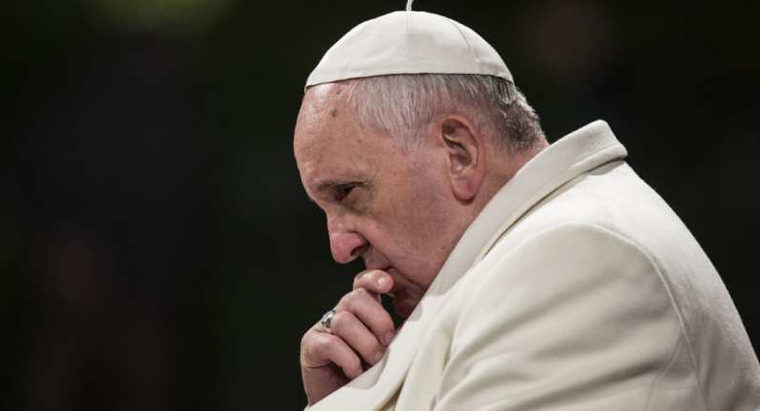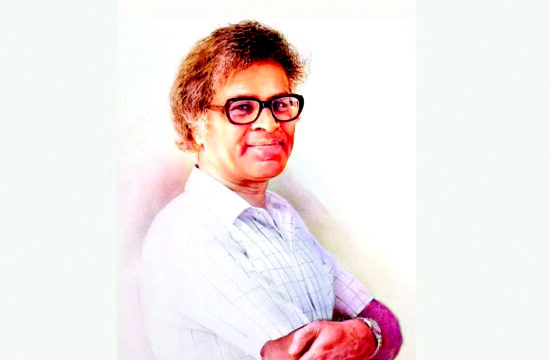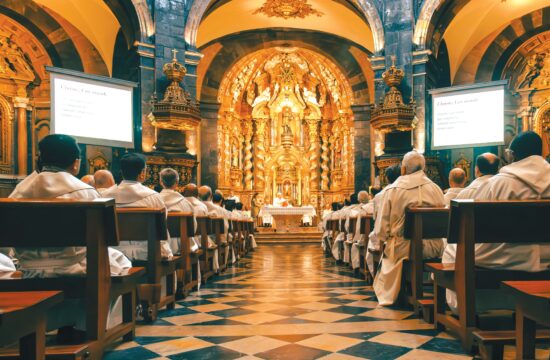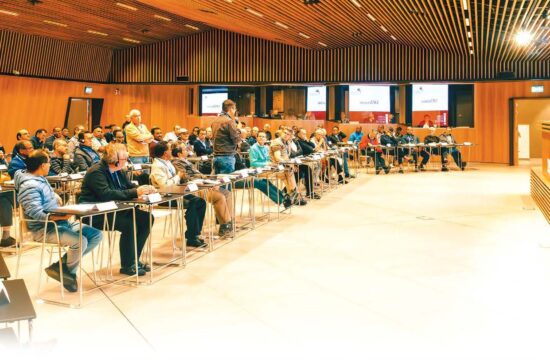Whither Francis effect? After the March 2013 election of Pope Francis, many were ecstatic about the ‘Francis effect’. Some four years later, Francis’s defects seem to have eclipsed the ‘Francis effect’, as follows:
A sugarcoated ‘filial correction’ signed by over 60 conservative churchmen sent to Pope Francis in August 2017 accused him of ‘heresies effected by Amoris Laetitia’ and of giving ‘scandal concerning faith and morals.’ In September 2016, four conservative cardinals submitted dubia-literally, ‘doubts’-covertly contesting his orthodoxy. Moreover, a July 31, 2017 letter of US Capuchin, Thomas Weinandy-member of Vatican’s International Theological Commission-faulted him for ‘demeaning’ doctrine, ‘calumny’ against his critics and appointing bishops who ‘scandalize’ believers with ‘dubious teaching and pastoral practice’.
Building upon my experience at GC 36, with theological tidbits I respond to these dubia not only arising from pitfalls of the Pope’s detractors, but also from antiquated theological bulwarks that bolster these dubia.
The Pope’s Surprise: As moderator of GC 36 ‘Commission on the Renewal of Jesuit Life and Mission’ (LMC) for drafting decrees, my LMC colleagues and I were hoping that Pope Francis would dish out clear-cut ‘apostolic preferences’ in his October 24, 2016 address to the GC. Francis surprised us. Instead of directives and decrees, he highlighted discernment.
Discernment, I realized, was the bedrock anchoring Pope Francis’s 3-point allocution to Jesuit companions at GC 36, “Seek consolation. Be crucified with Christ. Do good with a good spirit in communion with the Church.” Consolation, Crucifixion, Church-all dependent on discernment.
The March 2017 issue of JIVAN contained my article: ‘The A-B-C-D of GC 36’ with Audacity, Bridging, Collaboration, Discernment, summ-arizing GC 36. Let’s now examine six areas of dubia beginning with A-B-C-D-E-F-G. ‘D’ remains unchanged: Discernment!
A. Amoris Laetitia (AL) is the serious bone of contention. Aware of ground realities and being pastorally sensitive to irregular unions, AL n.305 reads, “[I]t is possible that in an objective situation of sin-which may not be subjectively culpable, or fully such-a person can be living in God’s grace, can love and can also grow in the life of grace and charity, while receiving the Church’s help to this end.” The attached footnote n.351 reads, “In certain cases this can include the help of the sacraments,” mildly suggesting that divorced and remarried couples may receive communion. AL 305 adds, “Discernment must help to find possible ways of responding to God.”
Pope Francis feels that inspired by God’s Spirit, Christians are capable of discernment in moral matters. But, Cardinals Raymond Burke, Walter Brandmüller, Carlo Caffarra and Joachim Meisner-drafters of the dubia-doggedly say: No! After submitting their dubia, Caffarra and Meisner have earned eternal rest. But, other anti-Francis hierarchs remain restless.
Pope Francis feels that inspired by God’s Spirit, Christians are capable of discernment in moral matters.
B. Bishops, post-Constantine, sometimes consider themselves as ‘princes’ owning episcopal palaces, donning royal paraphernalia and demanding unquestioning obedience. Pope Francis’s simple dress and disposition, strikingly different from that of Burke & Co., puts paid to episcopal ostentation. While Francis incarnates VC II’s Christus Dominus exhortation (n.16) to every bishop, ‘to be with his people as one who serves’, his advice is detested by princely bishops.
In April 2013, Francis constituted the ‘council of cardinals’ from around the globe. September 2013, denouncing the ‘psychology of princes’, he advised bishops, “Stay among your people. Don’t be ‘airport bishops’!” June 2017, Francis said to newly installed cardinals, “You are not called to be ‘Princes of the Church’ but rather to serve, attentive to the sin of the world.” Such reminders are resented by those wielding ecclesiastical power.
C. The Church according to Pope Francis must be poor, synodal, discerning, open-door, welcoming, outgoing and bruised. In Evangelii Gaudium (EG) n.47 and AL n.310, he repeats, “The Church is not a tollhouse; it is the house of the Father, where there is a place for everyone, with all their problems.” Love and mercy must mark our church as the true ‘Body of Christ’. This conception of the Church is unacceptable to churchmen who have always functioned within a pyramidal-modelled Church with grace trickling down to the laity-who merely pray, pay, and obey.
E. The Eucharist is the greatest Christ-given gift sustaining Catholic life. Five hundred years ago, besides critiquing the Mass as sacrifice and ‘transubstantiation’, Protestants objected to legalism, ritualism and Latinism, fuelled by Pharisaic clerics who controlled, categorized and condemned. Francis neither categorizes nor condemns. Rather, in his 24 September, 2013 homily he said, “The Eucharist is not a magic rite but an encounter with Jesus, who accompanies us in life.” Isn’t this real presence? In AL’s controversial footnote n.351, he reiterates EG n.47, “The Eucharist is not a prize for the perfect, but a powerful medicine and nourishment for the weak.”
On October 22, 2017, Pope Francis reminded Cardinal Robert Sarah, Prefect of the Congregation for Divine Worship and the Discipline of the Sacraments, that ‘recognition’ of local liturgical translations must rest with the Bishops’ Conferences, worldwide, while the job of the Vatican Congregation is merely to ‘confirm’ what is locally decided. Cardinals Burke and Sarah are unaccustomed to function outside the Augustinian: ‘Roma locuta, causa finita est’ framework. Frictions in all the above-mentioned areas arise largely because of the last two points-Faith and God-image-most crucial to our reflections.
F. Faith till the late Middle Ages meant saying “Amen” to all that the magisterium decreed. But, with the Enlightenment threatening the Church’s monopoly over truth and the Reformation’s sola fides (only faith) dictum denying any role for reason, the Church had to stress its ‘reason-able’ certitude in matters of faith and morals. Consequently, faith entailed assenting to timeless truths-the depositum fidei- entrusted to the Church by God.
VC II’s understanding of faith qualitatively differs from that of VC I. In 1870, VC I’s Dei Filius explained the Catholic understanding of faith, revelation and God in terms of a ‘propositional model’ while VC II’s Dei Verbum turned things upside down. Faith is no longer seen as mere intellectual assent to propositions descending from above, but as an invitation to enter into relationship with Jesus Christ. The latter ‘personal model’ necessitates a love for Jesus and a commitment to Christ’s cause. Finally, everything boils down to: Who is God for me, for us?
G. God created us in God’s image and likeness (Gen 1:26-27), but unfortunately we re-create God in our image and likeness. Being calculative, judgmental, conditional, unforgiving, etc., we construct distorted images of God and indulge in idolatry. Pope Francis strives to correct this God-image by exhorting us to “gaze at Jesus”. For Francis, God is not nameless, faceless, placeless, but has a name, Jesus; shows his face: merciful; and takes his place: beside us. Jesus walks with us and talks to us. To know God, Pope Francis suggests ‘three languages’ – of the mind (study), heart (prayer) and action (discipleship).
Our Pope of Hope: Despite the dubia Pope Francis exudes joy and hope because he communes with God. Reversing the order that I have adopted, his ‘God of mercy’ image fortifies his faith (F). His faith is nourished by the Eucharist (E) which moulds his image of the Church (C). With the Church modelled upon Christ, we will surely have Christ-like bishops (B) who will understand the dynamics of ‘amor’ (A) and with joy will stop commanding, categorizing and condemning. Didn’t Augustine say, “Love, and do as you please?” Discernment, Pope Francis believes, will ensure that you never go astray.
The author is a Gujarat Jesuit, professor at JDV, Pune, and a columnist with The Asian Age and The Deccan Chronicle.













I am happy that you are sending the Jivan online. It is great help to us who do not have access to it when we are in the ministry. Most of the time the magazine “disappears” in the midst of the pile of papers of Ours. I want to congratulate you for the initiative. May your tribe prosper and increase.
Joseph xavier sj. I am a Madurai Province Jesuit.
Free Samples Of Levitra Propecia Orkut Minoxidil Pharmacie Canadienne Cialis where to buy cialis online safely Lioresal Intrathecal
Heya superb blog! Does running a blog like this require a lot of work?
I’ve very little knowledge of programming but I was hoping to start my own blog in the near future.
Anyhow, should you have any suggestions or techniques for new blog owners please
share. I know this is off topic nevertheless I simply had to ask.
Appreciate it!
Hi there, just became alert to your blog through Google,
and found that it’s truly informative. I’m going to watch out for brussels.
I’ll appreciate if you continue this in future.
A lot of people will be benefited from your writing.
Cheers!
These are truly great ideas in regarding blogging.
You have touched some good things here. Any way keep up wrinting.
I think this is one of the most vital information for me.
And i’m glad reading your article. But want to remark
on some general things, The site style is great, the articles is really nice :
D. Good job, cheers
These are in fact great ideas in concerning blogging.
You have touched some nice points here. Any way keep up wrinting.
Hey there! I know this is kinda off topic nevertheless I’d figured I’d ask.
Would you be interested in trading links or maybe
guest authoring a blog post or vice-versa? My site covers a lot of the same subjects as yours and I think we could
greatly benefit from each other. If you are interested
feel free to shoot me an email. I look forward to hearing from
you! Awesome blog by the way!
Amoxicillin Effect On Kidneys Wie Funktioniert Levitra Zithromax Pills Online viagra Cialis Diario Prospecto Generic Levitra L Tabs
This is my first time pay a quick visit at here and i am
in fact impressed to read all at alone place.
Heya! I’m at work browsing your blog from my new apple iphone!
Just wanted to say I love reading your blog and look forward to all your posts!
Keep up the outstanding work!
Terrific work! This is the type of information that are supposed to be shared around the web.
Disgrace on the seek engines for now not positioning this submit upper!
Come on over and discuss with my website .
Thanks =)
Genuinely when someone doesn’t understand then its up to other viewers that
they will help, so here it happens.
Do you mind if I quote a few of your posts as long as I provide
credit and sources back to your weblog? My blog site is
in the very same niche as yours and my visitors would truly benefit from some of the information you present here.
Please let me know if this alright with you. Appreciate
it!
Can I simply just say what a relief to find an individual who
really knows what they’re discussing on the net. You
definitely understand how to bring an issue to light
and make it important. A lot more people must read this and understand this side of your story.
I was surprised you are not more popular because you most certainly have
the gift.
I visit everyday a few web sites and sites to
read content, except this weblog offers quality based writing.
Hi there! I simply wish to give you a big thumbs up for your great info you have right here on this post.
I will be coming back to your website for more soon.
Woah! I’m really loving the template/theme of this site.
It’s simple, yet effective. A lot of times it’s tough to get that “perfect balance” between superb usability and
visual appearance. I must say that you’ve done a great job with this.
In addition, the blog loads very quick for me on Chrome.
Exceptional Blog!
bookmarked!!, I love your site!
Wow that was unusual. I just wrote an extremely long comment but after I clicked submit my
comment didn’t appear. Grrrr… well I’m not writing all that over again.
Regardless, just wanted to say fantastic blog!
tetracycline
http://buyalbendazole.company/ – albendazole
albuterol
buy now tab isotretinoin isotret mastercard cod Buy Cialis Online Cheap Cialis Effets
read this
buy kamagra online
Eroxim Kamagra Order Now On Line Finasteride prix du levitra en espagne Cialis Fast Delivery
antibiotic tetracycline
http://tadalafil.agency/ – buy tadalafil online
doxycycline
orlistat over the counter
inderal
cialis buy online cheap
retin-a
http://cefixime.team/ – cefixime
xenical
seroquel
cialis
I was recommended this website via my cousin. I’m no longer
certain whether this publish is written through him
as nobody else realize such distinct about my problem.
You are wonderful! Thank you!
lasix
http://buybactrim.team/ – buy bactrim
xenical
buy metformin
vardenafil
http://xenical.best/ – xenical
generic citalopram
cialis buy online cheap
sildenafil
http://albuterol.best/ – click
prosteride
lasix
order generic cialis online
indocin
read full article
kamagra pills
http://prednisone.rodeo/ – where to buy prednisone tablets
cephalexin
avodart
kamagra jelly
http://clozaril.team/ – buy clozaril
pyridium
where can i buy xenical over the counter
kamagra
propecia
http://buyamoxicillin.team/ – buy amoxicillin online
cialis
prednisolone
http://levitra.surf/ – levitra
prednisone
anafranil
kamagra now
20mg tadalafil
propecia pill
http://buymotrin.team/ – buy motrin
super avana
kamagra now
Buy Nolvadex
kamagra now
http://buyavodart.team/ – avodart price
albendazole
Knee Infection Keflex Cialis E Fibrillazione Atriale where to buy cialis online safely Coumadin Achat Cialis En Andorre Kamagra Effets
celebrex pfizer
buy estrace
kamagra
http://1stprednisolonenow.com/ – buy prednisolone 5mg without prescription uk
proscar
buy lotrisone
http://tetracycline.agency/ – buy tetracycline antibiotics
motilium
generic motilium
http://prednisone.rodeo/ – prednisone
sildenafil
http://1ststromectolnow.com/ – stromectol
atenolol
where to buy valtrex online
xenical
http://buypropranolol.us.org/ – buy propranolol
allopurinol
provera
kamagra
valtrex
http://buytretinoin.company/ – tretinoin cream
buy ventolin
vardenafil hcl
price of propecia
xenical over the counter
http://buyantabuse.team/ – antabuse
prozac
cheap sildenafil citrate
valtrex medication
generic cialis tadalafil 20mg
can you buy propecia over the counter
http://tetracycline.yoga/ – tetracycline
Duloxetine
xenical
read this
more information
http://lexapro.yoga/ – cipralex generic best price
ventolin
Buy Gonorrhea Treatment Online Usa viagra Pharmacy India Online Buy Rodoxycycline Online
valtrex
propecia uk
proscar
levitra
http://buyclomid.company/ – clomid
buy estrace
sildenafil
orlistat over the counter
http://rocaltrol.team/ – rocaltrol
sildenafil
kamagra now
Tadacip Online Pharmacy Amoxicillin Price Express buy alli diet pills online Discount Online Cialis
buy viagra soft
http://ventolin.agency/ – ventolin
valtrex
sildenafil
tetracycline
allopurinol
vasotec generic
orlistat xenical
http://motilium.us.org/ – motilium cost
plavix buy
advair hfa inhaler
orlistat over the counter
cephalexin
propecia witout prescription
http://buyantabuse.company/ – antabuse
cafergot without a prescription
where to buy levitra online
antibiotic zithromax
cialis
http://1stprednisolonenow.com/ – prednisolone
vermox
prednisone
kamagra oral jelly 100mg
http://clonidine.team/ – clonidine
bupropion
buy viagra soft
xenical
orlistat xenical
http://levitraprofessional.us.com/ – LEVITRA PROFESSIONAL PILLS
avana
next page
betnovate cream
Celebrex
valtrex
http://buyantabuse.company/ – antabuse
prednisone
propecia
prednisone
clonidine
http://effexor.us.com/ – price of effexor
finasteride proscar
propecia
doxycycline
kamagra
prednisolone
http://buyvaltrex.team/ – continued
buy ventolin inhaler online
propecia
can you buy diflucan without a prescription
vardenafil visa
acyclovir
http://genericadvair.us.com/ – generic advair
atarax tablets
payday loans direct lenders
acyclovir
tadalafil generic
wellbutrin
hydrochlorothiazide 25
prozac
sildalis generic
orlistat 120mg
loan money
buy acyclovir online
xenical 120mg
cialis buy online cheap
need a loan now
buy sildenafil citrate 100mg
buy essays online
a loan with bad credit
doxycycline
borrow money
vardenafil
allopurinol
http://amoxilonline.us.com/ – amoxil pharmacy
buy zovirax
allopurinol
cafergot
buy cafergot
prednisone
colchicine price
homework help online
order tetracycline online
buy essay online
sildenafil
cafergot pills
buying tetracycline online
buy sildenafil citrate online
simple loan
payday loans san diego
abilify no rx
http://1stfurosemidenow.com/ – furosemide 20 mg tablets
tax anticipation loan
buy levitra 20 mg
buy cheap diflucan online
order allopurinol online
wellbutrin
tenormin atenolol
buy female viagra online
fast loans
online essay
payday lender
tetracycline
paxil insomnia
azithromycin
personal loan rate
atarax 25mg
cialis
buy sildenafil online
buy sildenafil
best payday loans online
doxycycline
Citalopram 20mg
do my homework
http://buyxenical.team/ – xenical
money fast
female viagra buy online
tadalafil 20 mg
doxycycline 100mg online
cafergot
xenical
buy cheap allopurinol
wellbutrin
fast cash lenders
atenolol generic
payday loans direct lenders
a loan with bad credit
levitra
http://buyxenical.company/ – where can i buy xenical over the counter
diflucan generic
sildalis without prescription
buy essay online
lisinopril pills
acyclovir
atenolol buy
http://robaxin.team/ – robaxin
more info
need help with anatomy and physiology
bad credit loans
xenical
zovirax acyclovir
http://cleocin.us.com/ – cleocin pharmacy
zithromax
need a loan with bad credit
bad credit consolidation loans
http://levitra.surf/ – levitra
where can i buy amoxicillin
http://proscar.us.com/ – proscar drug
antabuse
Hydrochlorothiazide
purchase valicyclovir online
cafergot online
read full article
do your homework
levitra
robaxin online
Viagra 88 Keys Lyrics Priligy Euro viagra online pharmacy Finasteride Costi Propecia Clomid Online Overnight Generic Viagra Vs Brand Viagra Reviews
buy fluconazole
http://1stdoxycyclinenow.com/ – buy doxycycline hyclate 100mg without a rx
Torsemide
buy sildenafil
vibramycin 100 mg
hydrochlorothiazide medication
allopurinol oral
wellbutrin
http://vasotec.team/ – vasotec
where to buy allopurinol
zithromax
wellbutrin 150 mg
propecia
http://buyamitriptyline.team/ – buy amitriptyline
ww2 homework help
azithromycin 500 dosage online pharmacy
where to buy vardenafil
20mg tadalafil
atenolol
http://viagrasoft.team/ – buy viagra soft tabs
easy loans no credit check
hctz no prescription
atarax 10 mg
cheap cialis
tadalafil tablets
buy cheap levitra online
lisinopril 20mg tablets
http://buybenicar.us.com/ – generic benicar
sildalis
payday lending
buy viagra online
allopurinol
acyclovir
lotrisone
money fast
http://buyretina.company/ – buy retin a
atenolol cost
buy atarax online
http://cefixime.team/ – cefixime
http://lasix.yoga/ – lasix
viagra india online
levitra pills
easy payday
http://sildenafil.yoga/ – sildenafil
levitra
cialis canada online
antabuse
http://inderal.team/ – inderal la
buy nexium
Buy Provera
colchicine
amoxicillin tabs
cephalexin
synthroid
cafergot generic
easy payday loan
http://1stvardenafilnow.com/ – vardenafil
buy prozac online uk
sildalis online
http://augmentin.team/ – augmentin generic
cialis
homework
tetracycline
doxycycline
azithromycin 250 mg
cafergot
http://abilifygeneric.us.com/ – abilify without a prescription
cialis
payday lender
sildenafil
buy cephalexin
sildalis
easy loans no credit check
writing essays
levitra
tetracycline prescription
cheap prednisolne
doxycycline capsules
http://ventolin.agency/ – ventolin
female viagra cheap
sildalis without prescription
allopurinol zyloprim
http://buyazithromycin.team/ – buy azithromycin
http://bupropion.company/ – bupropion
http://1ststratteranow.com/ – strattera
hydrochlorothiazide 25
buy cafergot
http://buypropecia.company/ – can you buy propecia over the counter
mobic
Buy Cephalexin
metformin hydrochloride
wellbutrin xl 300 mg generic
avodart
lexapro generic
metformin
http://buynexium.team/ – nexium 40mg
viagra
prednisolone buy online
allopurinol 300mg
zoloft without prescription
allopurinol online
diflucan buy without prescription
order diflucan
http://buytretinoin.company/ – tretinoin cream
buy medrol
payday loans online
zithromax
generic cialis
buy atenolol
http://sildenafil.cc/ – sildenafil citrate 100mg tab
atarax 10 mg
orlistat
buy essay online
vantin
source
payday loans in charlotte nc
http://amoxil.team/ – amoxil 500
wellbutrin xr
http://allopurinol.agency/ – allopurinol
http://ventolin.rodeo/ – ventolin
sildalis
levitra sales
http://buyfurosemide.company/ – buy furosemide
where can i buy zithromax online
http://lexapro.team/ – lexapro
sildenafil buy
yasmin sale
cialis
amoxicillin
buy generic doxycycline
biaxin
http://buspar.team/ – buspar
payday lender
purchase lexapro
levitra
homework help college
get the facts
http://1stvardenafilnow.com/ – go here
zovirax
low doc loan
elavil medication
tadalafil
xenical canada
click here
buy essays
best payday loans online
doxycycline
buy essay online
generic tadalafil
hydrochlorothiazide 25
sildalis
http://cephalexin02.us.com/ – keflex 250
propranolol
kamagra
more helpful hints
buy diflucan
buy acyclovir without a precription
here
payday lending
direct lenders for bad credit
learn more here
buy vardenafil canada
http://sildenafil.agency/ – sildenafil
best payday loans online
http://buycialis.company/ – where can i buy cialis
tadalis
order cialis
http://sildalis.team/ – sildalis
zoloft
where to buy levitra
buy acyclovir cream
tadalafil
http://propecia.agency/ – fincar
allopurinol 100mg
atenolol 25 mg tablets
generic for atarax
retin a
where to buy amoxicillin
generic atarax
http://vantin.team/ – vantin antibiotic
clonidine
lisinopril
http://avana.team/ – buy avana
cost of vardenafil
lisinopril hydrochlorothiazide
yasmin online
viagra for females
order zoloft online without prescription
sildenafil citrate online
university essay
generic kamagra
tadalafil
lisinopril
Prednisone
orlistat xenical
propranolol
vardenafil
doxycycline hyclate 100 mg
tadalafil tablets
kamagra
wellbutrin xl 300mg
tetracycline online
orlistat 120mg
sildalis
best loans for bad credit
doxycycline
zithromax
http://buycipro.company/ – cipro pill
cafergot pills
synthroid
http://zyban.team/ – zyban
http://buykamagra.team/ – kamagra oral jelly usa
prednisone
azithromycin 500 mg tablets
amitriptyline
http://buyprednisolone.team/ – prednisolone
atarax generic
albuterol tabs
money fast online
lisinopril no prescription
http://1stacyclovirnow.com/ – acyclovir 400mg tab
Lexapro Prices
cost of albuterol
loans bad credit
online loan
buy generic cialis online canada
diflucan
diflucan
tetracycline online
http://buytrazodone.company/ – trazodone 100 mg
azithromycin 250mg
vardenafil buy
atarax 50 mg
online payday loans no credit check
lexapro
http://strattera2017.us.com/ – strattera
buy atarax
purchase azithromycin 500 mg tablets
buy levitra
sildenafil online
english assignment help
valtrex prices
help with homework
doxycycline monohydrate
wellbutrin
generic tadalafil 20mg
http://lasix.agency/ – lasix
cymbalta
phenergan online
xenical 120
atenolol 100mg
tadalafil
Xenical
doxycycline 100 mg
homework
buy viagra
azithromycin
PURCHASE PAXIL
http://buytetracycline.company/ – buy tetracycline
buspar
http://1stalbuterolnow.com/ – albuterol
http://buylisinopril.team/ – lisinopril
essay writing help
atenolol 50 mg
albuterol
medrol online
http://zithromax.agency/ – zithromax
buy female viagra online
buy cafergot
http://metformin.surf/ – metformin
zofran
buy cytotec
where to buy levitra
doxycycline hyclate
sildenafil
generic kamagra
prednisone 60 mg
http://levitra.yoga/ – purchase levitra online
http://bupropion.company/ – bupropion
simple loan
where can i buy acyclovir
doxycycline
generic atarax
nolvadex
levitra 20mg
http://buyventolin.company/ – buy ventolin inhaler without prescription
diflucan over the counter
generic viagra
buying baclofen online
female viagra
orlistat xenical
cost of cipralex daily
atarax 25 mg
allopurinol
payday lender
albuterol
cafergot
medication prednisone
payday loans online no credit check
http://provera.us.com/ – provera
Vermox Online
acyclovir medication
payday loans in ct
http://1stvaltrexnow.com/ – generic for valtrex
diflucan
prednisolone
vardenafil buy
http://mebendazole.us.com/ – mebendazole
ampicillin
sildenafil products
atarax
http://onlinelevitra.us.com/ – buy levitra
australian assignment help
sildalis
tadalafil
where to buy cialis cheap
http://buyvaltrex.team/ – generic valtrex online without prescription
sildenafil
zithromax tablets
http://synthroid.surf/ – drug synthroid
atenolol
buy levitra
do my homework
vibramycin
http://buyallopurinol.team/ – buy allopurinol
buy stromectol
rocaltrol without prescription
xenical 120
cymbalta mastercard
diclofenac sodium 75
levitra 20 mg cost
zithromax azithromycin
lisinopril
acyclovir
http://sildenafil.yoga/ – where to buy sildenafil citrate online
erythromycin
retin-a
buy diflucan
http://buyventolin.company/ – ventolin
online payday loans no credit check
sildenafil online
hydrochlorothiazide 25 mg tab
buy atarax online
Tadalafil
payday lending
http://requip.team/ – requip xl
tenormin
buy colchicine 0.6 mg
http://advairgeneric.us.com/ – Advair Diskus
doxycycline 100mg
cheap celexa online
diclofenac
online viagra pills
female viagra
online payday loans
doxycycline
acyclovir 400mg tablets
valtrex
loan with bad credit
http://prozac.yoga/ – prozac online
money lenders
tadalafil
http://genericnexium.us.com/ – generic nexium
hydrochlorothiazide 25
cialis 50 mg
baclofen tablets 10mg
tetracycline generic
order diflucan online
vardenafil buy
tetracycline antibiotic
xenical orlistat
buy xenical online
loan bad credit
lisinopril 15 mg
atarax online
Buy Hydrochlorothiazide
xenical
generic atarax
buy essay
kamagra
sildenafil citrate online
sildenafil pfizer
http://onlinelevitra.us.com/ – online levitra
viagra
http://buysynthroid.team/ – buy synthroid
http://allopurinol.surf/ – cost of allopurinol
atenolol tenormin
short persuasive essay
Sildenafil Citrate
money right now
http://genericnexium.us.com/ – BUY NEXIUM ONLINE
azithromycin 500 mg
propecia 5mg for sale
buy levitra
http://1stcafergotnow.com/ – cafergot generic
cheap tadacip
Ventolin Hfa
atenolol 50mg
tetracycline online
buy cafergot
wellbutrin
prednisolone acetate
cafergot pills
buy valtrex
http://tadalafil.yoga/ – tadalafil for sale
money fast
bupropion tablets
http://1stprednisonenow.com/ – prednisone
cialis
payday lending
buy celebrex without prescription
mobic
order diflucan online
vardenafil
buy tadalafil
buy atarax
wellbutrin
atenolol 100mg
zovirax cream
parent loan
xenical 120
viagra 100mg pills
http://arimidex.team/ – where to buy arimidex online
http://mobic.team/ – buy mobic online
this site
http://orlistat.team/ – orlistat
purchase indocin
buy sildenafil citrate
how to get cipralex
http://buydoxycycline.team/ – doxycycline mono
prednisolone
http://buyvaltrex.company/ – valtrex
buy vardenafil
Buy Diflucan Without A Prescription
atenolol 100mg
levitra
colchicine canada
Stromectol Online
synthroid
homework
http://metformin.agency/ – metformin
cephalexin keflex 500 mg
tadalafil 20 mg
celebrex
http://buyviagra.company/ – viagra
bactrim
homework
female viagra
where to get cialis
Buy Yasmin Over Counter
price of allopurinol
nolvadex
albuterol
colchicine 0.6mg
azithromycin 200mg
uc admissions essay help
http://buytadalafil.team/ – tadalafil
buy atarax pills
payday loans online
loans with collateral
buy diflucan without prescription
Prednisone
easy payday loan
buy clonidine
allopurinol 300 mg
generic tadalafil 20mg
essay writing help
over the counter diflucan
http://buybupropion.team/ – bupropion
http://buyprednisone.us.org/ – BUY PREDNISONE
buy allopurinol
http://buytadalafil.team/ – tadalafil
Torsemide
http://buyventolin.team/ – buy ventolin inhaler online
levitra 20 mg
wellbutrin
monthly installment loans
personal lending
http://albuterol.surf/ – albuterol for sale online
atenolol 25mg
buy generic valtrex
buy levitra online usa
more information
bad credit loans
sildalis
elimite
levitra 20mg
cipro 250mg
http://buytetracycline.company/ – tetracycline
estrace
seroquel
diflucan without prescription
allopurinol pills
ZITHROMAX ONLINE
generic tadalafil
http://prednisone.agency/ – where can i buy prednisone online
order acyclovir online
cheapest clindamycin
propecia
atarax pills
buy essay
inderal
female viagra
generic sildalis
azithromycin generic
http://cialis03.us.com/ – cheap generic cialis
info
buy essays online
easy payday
buy tetracycline
cipro
buy acyclovir
cephalexin cost
atarax online
inderal la 80 mg
tadalafil
http://lipitor.team/ – lipitor
buy vardenafil canada
tetracycline online
http://prednisone.best/ – prednisone10 mg
http://lexapro.cc/ – lexapro
http://propecia.rodeo/ – where to buy finasteride online
diflucan fluconazole
http://vermox.team/ – vermox
amoxicillin online
serpina
viagra online rx
albuterol
vardenafil buy
propranolol
prednisone
20mg cipralex
http://inderal.team/ – inderal la
atarax 10mg
propecia
generic cialis tadalafil
albuterol
nolvadex
triamterene hydrochlorothiazide
sildenafil
zovirax pill
buy lotrisone online
payday lender
http://cheapvardenafil365.us.com/ – vardenafil
citalopram
vardenafil
atenolol
levitra 20mg
help with homework
doxycycline
Furosemide
tadalafil generic
sildalis
tetracycline antibiotic
visit this link
generic zoloft price
http://lexapro.surf/ – lexapro escitalopram
student college essays
where to buy levitra
http://synthroid.best/ – where to buy synthroid
http://buyalbendazole.team/ – buy albendazole
click this link
levitra
sildenafil citrate online
effexor
http://lasix.cc/ – buy lasix without a prescription
Viagra Schachtel Acquistare Sildenafil viagra Canadian Mall Pharmacy Fedex Shipping Progesterone Mail Order
easy payday loans
http://buyflagyl.us.org/ – Buy Flagyl Online
generic tadalafil 20mg
buy sildenafil
lisinopril
atarax generic
cephalexin
essays help your friend to decide what career
http://onlineclomid.us.com/ – online clomid
female viagra cream
inderal
online payday loans direct lenders
payday loans
how much is cipralex
http://1stindocinnow.com/ – found it for you
direct lender payday loans
loan money
toprol xl
cafergot generic
fluconazole
buy sildenafil online
wellbutrin 300 mg
paxil
viagra online
wellbutrin xl 300 mg generic
http://1stsildenafilnow.com/ – sildenafil
metformin
methotrexate cost
hydrochlorothiazide 25 mg
phenergan
seroquel
buy diflucan without prescription
tetracycline
tadalafil
atarax 10mg
antabuse
http://levitra.surf/ – levetra
generic levitra online
where to buy azithromycin
http://1stsynthroidnow.com/ – buy synthroid without prescription
http://1stprednisonenow.com/ – prednisone
acyclovir 400 mg
http://levitraprofessional.us.com/ – levitra professional
diflucan over the counter
buy fluconazole
metformin
http://buycolchicine.company/ – buy colchicine
cash payday loans online
lisinopril 20mg tablets
wellbutrin xl 150
trazodone
buy acyclovir online
cafergot tablets
sildalis online
http://valtrex.cc/ – read this
nolvadex 20 mg
propecia
statistics homework solver
personal lending
cipro xl
http://cymbalta.team/ – cymbalta 30 mg
order diflucan online